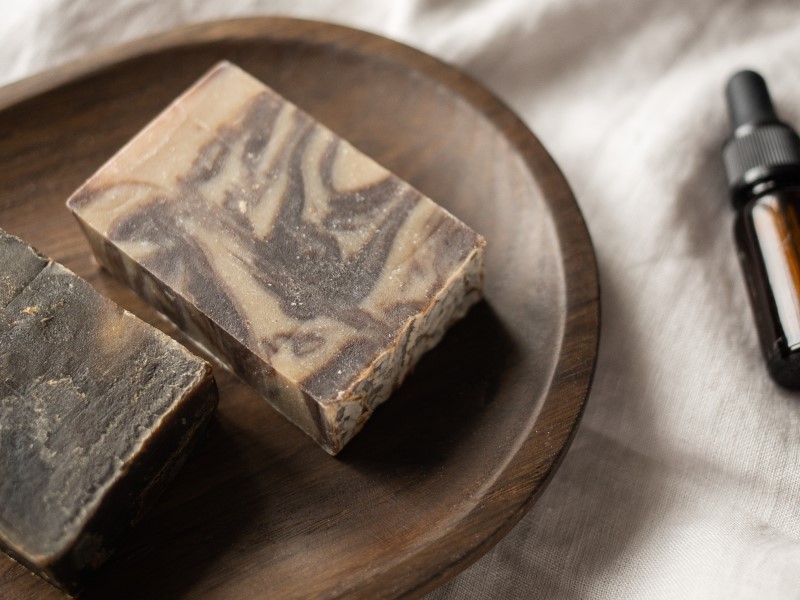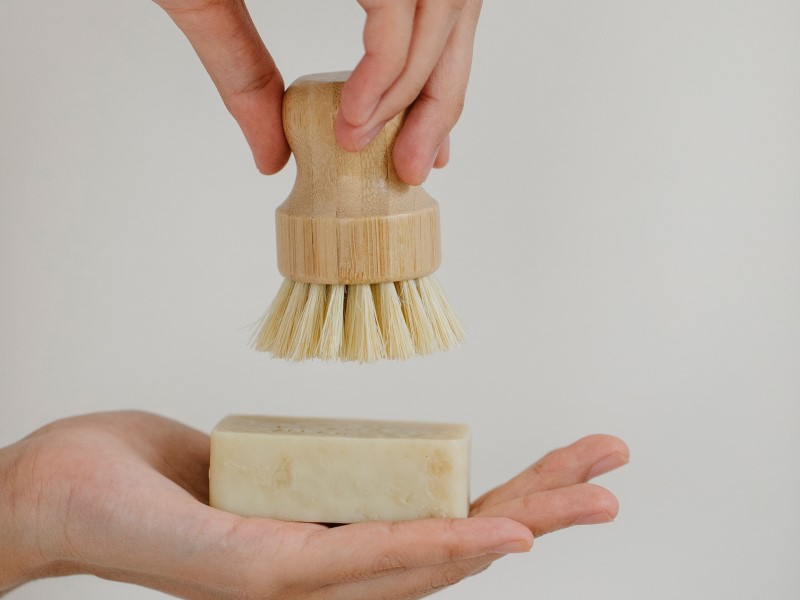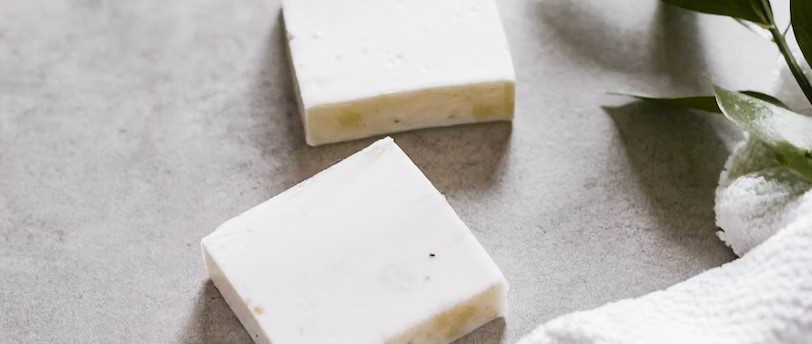If you’re tired of using commercial soaps that make your skin feel dry and irritated, it might be time to consider the amazing benefits of organic soap. These are made with gentle and nourishing ingredients rather than harsh chemicals. As a result, they’re a much better option for you and your family, and you can even make your own handmade soaps that will save you money too!
Not only is it good for your skin, but it also positively impacts the environment. Unlike conventional soaps that contain synthetic ingredients and harmful chemicals, organic soap is made with natural and biodegradable substances. This means that when you use organic soap, you aren’t just taking care of your skin, but contributing to a cleaner and greener planet. So, give our article a read, and then you can decide if making a switch is right for you.
Table of Contents

Gentle, Nourishing and Natural Ingredients
Organic soap is not only gentle and nourishing, but it also gives your skin a more natural experience. Commercial soaps are filled with harsh chemicals and synthetic additives. Organic soaps contain natural ingredients that are gentle on the skin. These soaps are often enriched with nourishing oils, such as coconut oil, olive oil, and shea butter. These oils help to moisturize and hydrate the skin. Using organic ingredients ensures the soap does not strip away the skin’s natural oils, leaving it feeling soft, smooth, and supple.
In addition to being gentle, organic soaps also offer a luxurious and indulgent experience for your skin. Many organic soap varieties are infused with natural essential oils and botanical extracts, which give off a nice fragrance and offer other skin benefits. A couple of examples are lavender essential oil and tea tree oil. Lavender is known for its calming and soothing properties, while tea tree oil is renowned for its antibacterial and antifungal properties.
In the list below, you can see 9 essential oils that are commonly used in organic soaps and the benefits of their scents:
| Essential Oil | Scent | Oil Benefits |
|---|---|---|
| Lavender | Floral, calming, and herbal | Relieves stress, promotes relaxation and sleep. |
| Peppermint | Refreshing, minty | Invigorates the mind, reduces fatigue and nausea. |
| Eucalyptus | Woody, camphorous | Clears the respiratory system, offers mental clarity. |
| Tea Tree | Medicinal, earthy | Has antibacterial properties, good for skin issues. |
| Citrus (Orange, Lemon, Lime) | Fruity, uplifting | Boosts mood, energizes, and provides a fresh feel. |
| Chamomile | Sweet, apple-like | Soothes skin, promotes relaxation and reduces stress. |
| Rosemary | Herbaceous, woody | Enhances focus, stimulates circulation, and clarity. |
| Ylang Ylang | Floral, exotic | Eases anxiety, encourages relaxation and sensuality. |
| Frankincense | Resinous, woody | Aids in meditation, reduces stress, and balances. |
When you use gentle and nourishing ingredients, it leaves your skin feeling refreshed and rejuvenated. So why settle for harsh and synthetic soaps when you can pamper yourself with the goodness of organic soap? Make the switch, and you’ll probably be surprised at how fresh your skin feels and smells.
Ideal for Sensitive Skin and Allergies
Organic soaps are made with natural ingredients that are gentle and nourishing for the skin. If you or your family suffer from skin issues like sensitivity or allergies, you’ll know how frustrating this can be. Unfortunately, most of us go with the easy-to-find, mass-produced soaps and presume they’ll benefit us. Looking a little deeper, you’ll find that most commercial soap is made with chemicals that add fragrance or break down dirt. Many of these chemicals can irritate sensitive skin or trigger allergies. On the other hand, organic soaps are formulated with plant-based oils, such as coconut oil, olive oil, and shea butter. These ingredients help to hydrate and nourish the skin, leaving it feeling soft and supple.
In addition to being gentle on the skin, organic soaps are also free from common allergens. Many people with allergies or sensitivities to certain ingredients, such as artificial colours and fragrances, find that organic soaps are a better option. When you choose an organic manufacturer, you can avoid potential irritants that may cause itching, redness, or other allergic reactions.
Wondering why your soap makes your skin break out in irritations? These list of 9 common ingredients in commercial soaps might answer that question:
| Ingredient | Reason for Skin Irritation |
|---|---|
| Fragrances | Synthetic fragrances can cause allergic reactions. |
| Parabens | Can disrupt hormonal balance and lead to skin sensitivity. |
| Sodium Lauryl | Harsh surfactant that strips natural oils, causing dryness. |
| Sulfate (SLS) | Can lead to skin dryness, redness, and irritation. |
| Formaldehyde | A preservative that can cause skin allergies. |
| Propylene Glycol | May cause skin irritation and allergic reactions. |
| Artificial Colors | Synthetic dyes can trigger skin sensitivity. |
| Phthalates | Can lead to skin irritation and worsen existing conditions. |
| Alcohol | Drying effect, causing redness, flakiness, and discomfort. |
Natural products are often made without the use of harsh preservatives, such as parabens, which can also be a trigger for sensitive skin. Overall, switching to organic soap and skincare products can be a great choice for those with sensitive skin or allergies. It provides a gentle and nourishing clean without the risk of irritations or allergic reactions.
Eco-Friendly and Biodegradable: Great for the Environment!
Organic soaps are healthier for the environment too! They will clean your skin just as well as any supermarket soap but are eco-friendly and biodegradable. Natural soap bars and liquids are made from natural ingredients that are grown without the use of synthetic pesticides or fertilizers. This means they do not contribute to water and soil pollution, making them a great choice for those who want to reduce their carbon footprint. Since organics are biodegradable, they break down naturally and do not harm the environment. We often forget or don’t even consider what happens to the soap that goes down the drain. Commercial soaps contain chemicals and additives that can harm aquatic life and pollute waterways. You make a really responsible choice when switching to an organic option. It’s also a small but important step towards a more sustainable and eco-friendly lifestyle.

Free from Harmful Chemicals: Fewer Skin Problems for you and your Family
Say goodbye to harsh chemicals and hello to a soap that nourishes your skin without any worries. One of the most significant benefits of organic soap is that it is free from harmful chemicals. Unlike conventional soaps, which often contain synthetic ingredients and artificial fragrances, organic soaps are made from natural ingredients that are gentle on the skin. This means that you can cleanse your body without exposing it to potentially harmful substances. Whether you have sensitive skin or want to avoid unnecessary chemicals, organic soap can provide peace of mind and promote overall skin health.
If you have a baby or a young child, there’s even more reason to make the change. Children’s skin hasn’t yet developed, and can be more prone to developing skin problems like rashes and eczema. Organic soaps help to lower the chances of your child ever needing to worry about these issues, or reducing skin issues that they might already have.
Still on the fence? Here are 12 reasons to choose natural soap that might help you make the change to organics!
Reduces Carbon Footprint: Support an Environmentally Friendly Industry
By choosing organic soap, you can shrink your carbon footprint and leave a lighter environmental mark while washing away the day’s grime. Organic soaps are made from natural ingredients grown without synthetic fertilizers, pesticides, or genetically modified organisms (GMOs). This means that organic soap production has a significantly lower impact on the environment than conventional soaps.
One of the main reasons organic soap reduces carbon footprint is that it doesn’t contain harmful chemicals that can pollute water systems. When you use conventional soaps, the chemicals present in them can end up in rivers, lakes, and oceans, causing damage to aquatic life and ecosystems. Organic soap, on the other hand, is made from plant-based ingredients that are biodegradable and do not pose a threat to the environment. You can help protect water sources and preserve aquatic habitats by using organic soap.
Producing organic products also involves less energy consumption and greenhouse gas emissions. Conventional soaps often require fossil fuels in their production processes, which contributes to climate change. In contrast, organic soap manufacturers prioritise sustainable practices, such as using renewable energy sources and reducing waste. These efforts result in a significantly lower carbon footprint for organic soap production. By choosing organic soap, you support a more environmentally friendly industry and positively impact the fight against climate change.
Frequently Asked Questions
Q: What are organic soaps?
A: Organic soaps are soaps that are made from natural ingredients and do not contain any harsh chemicals or synthetic additives.
Q: How do organic soaps differ from regular soaps?
A: Organic soaps are made using natural ingredients, such as plant oils, herbs, and essential oils, while regular soaps often contain chemicals and synthetic fragrances.

Q: What are the benefits of using organic soaps?
A: Organic soaps have several benefits, including being gentle on the skin, moisturizing, and containing natural antibacterial and antimicrobial properties.
Q: How are handmade organic soaps different from commercial soaps?
A: Handmade organic soaps are made in small batches using carefully selected natural ingredients, while commercial soaps are mass-produced and often contain artificial ingredients.
Q: What are the reasons to use natural soap?
A: Natural soaps are better for your skin as they do not strip away natural oils and are free from harmful chemicals that can cause skin irritation and allergies.
Q: What are the benefits of natural soap?
A: Natural soap can help maintain the natural pH balance of your skin, provide nourishment, and promote healthy skin by improving moisture retention.
Q: What are the benefits of handmade soap?
A: Handmade soap is made with care and attention to detail, often containing higher concentrations of beneficial ingredients and providing a luxurious and unique experience.
Q: Why should I switch to natural soap?
A: Switching to natural soap can help improve your skin’s overall health and appearance, as it avoids the harsh chemicals found in many commercial soaps.
Q: What are the amazing benefits of organic soaps?
A: Organic soaps provide a range of benefits such as improving skin conditions, soothing dry skin, reducing skin irritations, and supporting a healthier environment.
Q: Why are organic soaps better for your skin?
A: Organic soaps are better for your skin because they are made up of natural ingredients that are gentle and nourishing, without any harsh chemicals or artificial additives.
Conclusion
Organic soap offers numerous benefits that make it a superior choice for personal hygiene. The gentle and nourishing ingredients provide a luxurious and rejuvenating experience for the skin. This makes it ideal for individuals with sensitive skin or allergies, as it reduces the risk of irritation or adverse reactions. Organic soap is also environmentally friendly and biodegradable, ensuring that it does not harm the planet or contribute to pollution.
By choosing organic soap, individuals can also avoid harmful chemicals commonly found in conventional soaps, such as synthetic fragrances and preservatives. This benefits their health, reduces their carbon footprint, and supports sustainable practices. Overall, incorporating organic soap into your daily routine is a small yet impactful step towards a healthier and greener lifestyle.
About the Author

CHARLIE
Hi, my name is Charlie. I’m the founder of Just Organics. I have a background in Environmental Health and am passionate about animal welfare. I have been using organic products for more than ten years and would like to share my love of products made from nature.
I hope you find value in our articles. If there’s anything you’d like us to write about or if you’d just like to connect with us, feel free to send us a message.
